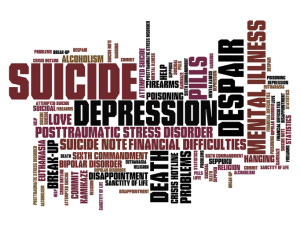 Suicide is often thought of as a taboo topic, we seem to shy away from talking about it as though it is a shameful act. Suicide is not shameful, or selfish, or irresponsible. For many it is the only way they see that will end the pain, suffering or loneliness that they experience.
Suicide is often thought of as a taboo topic, we seem to shy away from talking about it as though it is a shameful act. Suicide is not shameful, or selfish, or irresponsible. For many it is the only way they see that will end the pain, suffering or loneliness that they experience.
There is a wide spectrum of what can be defined as suicidal behaviour, ranging from ‘low-level suicidal ideation’ (occasionally thinking about ending your life) through to deliberate, harmful action towards oneself that results in death. Self-harm can also be described as suicidal behaviour. Self-harm is a form of mutilation that has the intention of hurting oneself, most commonly seen through, cutting, burning, hitting, picking at skin, pulling hair, biting and carving. If you witness any signs of the above self-harm please reach out and tell someone.
Understanding suicide is hugely important as intentional self-harm in New Zealand is on the rise. Last year alone, 579 people committed suicide, this is the worst it has been since records began in 2008. This 2016 statistic is only based on those who have committed suicide, there are many, many more who have attempted or experience suicidal ideation.
Suicide is not something that only occurs in the mental health demographic, anyone can experience suicidal behaviour. Whether you are from a low-socioeconomic status, suffering with illness, a celebrity, successful business man, a stay at home parent, etc, we all can experience suicidal behaviour. Suicide also does not discriminate between gender, race or age. It occurs in all age groups, all cultures and all genders.
However, there are statistics that suggest certain genders, age groups and ethnicities are more susceptible than others. Historically in New Zealand, men are more likely to commit suicide than women. Though recently, the gap between them is getting smaller- from 3 men to 1 women, to now 1 women to 2.5 men. In other words, out of the 579 people who last year committed suicide, 170 are women and 409 are men. It was also identified that men between the ages of 25-29 years and women aged 40-45 year old may be more prone to committing suicide. When it comes to cultures and suicide, the statistics showed that Maori have higher rates than other ethnicities, with men and women equally susceptible.
For many people, suicide feels like the only option to end the constant agony that they experience every day. Some have described their experience as ‘an overwhelming sense of sadness that cannot be shaken. They feel drained of peace, hope and happiness, where every happy memory is absent and all that is left is the worst experiences of your life’. To feel like this, is not merely feeling down, it is the inability to imagine ever being happy again. Therefore, any suicidal behaviour should be taken seriously.
While there is no definite way to identify if someone is about to harm themselves or commit suicide, there are some warning signs that may help to save someone’s life.
- Increasing their alcohol and/or other drug use
- Taking unnecessary risks and impulsivity
- Threatening suicide and/or expressing a strong wish to die
- Exhibiting rage and/or anger
- Talking about wanting to die or to kill oneself
- Fascinating over or preoccupying oneself with death
- Talking about feeling hopeless or having no reason to live
- Talking about being a burden to others
- Acting anxious or agitated; behaving recklessly
- Isolating or withdrawing oneself
- Displaying mood swings
- Telling loved ones goodbye
- Setting one’s affairs in order
- Giving things away, such as prized possessions
- Referring to death via poetry, writings and drawings
- Exhibiting dramatic changes in personality or appearance
- Changing eating or sleeping patterns
- Declining in performance
- Spending excessive time in bedroom or bathroom
If someone has thoughts or feelings about suicide it is important to take them seriously, support from people who care about them can be really helpful and encourage them through dark times. However, if someone has attempted suicide or you are worried about their immediate safety, you can contact the following places for support and advice.
- Call your local mental health Crisis Assessment Team or go with them to the emergency department (ED) at your nearest hospital. (See below for your local Crisis Team.)
- If they are an immediate physical danger to themselves or others, call 111.
- Stay with them until support arrives.
- Remove any obvious means of suicide they might use, eg, guns, medication, car keys, knives, rope.
- Try to stay calm and let them know you care.
- Keep them talking: listen and ask questions without judging.
- Make sure you are safe.
There are also helplines which are accessible 24/7 and can offer support via the phone. Below are the New Zealand suicide helplines:
- Lifeline 0800 543 354 or 09 522 2999
- Suicide Prevention Helpline 0508 828 865 (0508 TAUTOK0)
- Youthline 0800 376 633 or free text 234
- Samaritans 0800 726 666
(Information sourced from Ministry of Health and Psychology Today).